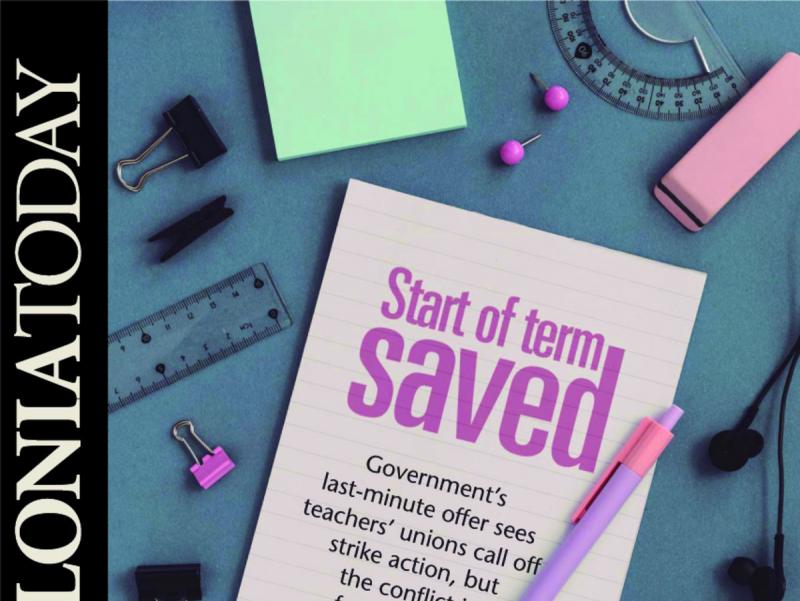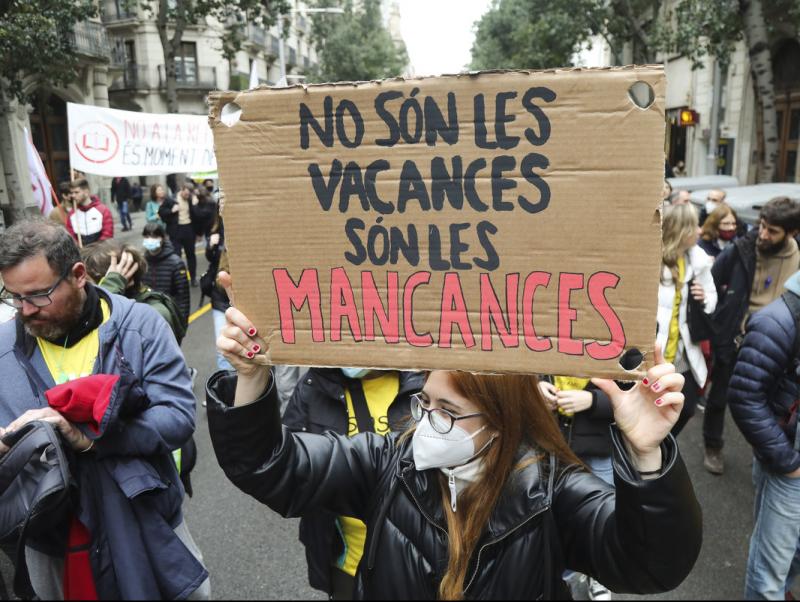“It may be that in these first weeks there is a lack of preparation and coordination”
We spoke to Jordi Giménez, vice-president of the Federation of Associations of Fathers and Mothers of Secondary School Students of Catalonia, FAPAES, and its representative in the Catalan School Council and the Unitary Framework of the Educational Community, or MUCE. The main conflict started in February but until August 31 there was no move by the education department to make anyone think anything could be resolved. During this time, and even more so in the final few weeks, FAPAES was the source for finding out how parents with children in secondary education felt.
“We’re not the ones to assess whether the demands of the teachers are appropriate, but we think it’s a shame, for the whole community that the teachers and the council don’t agree. It’s been like this for months. There is tension among the teachers and that has consequences. This past year, many pupils, especially in public schools, have missed five or six days of class,” points out Giménez.
FAPAES above all wanted a resolution. The beginning of the school year, he says, already has enough problems: “Let there be no more stoppages,” is his demand. For FAPAES, the two major changes in 2022-2023 are the bringing forward of the start of the school year and the introduction of the new curriculum provided for in the LOMLOE (the state education law).
“Regarding the bringing forward of the school year, we surveyed our associated AMPAs [parents’ associations] and a significant majority thought it was a good thing. The holiday period for pupils is too long. And it’s also not hard to see that bringing forward the start of the school year could help reduce inequalities: a family with more purchasing power can better manage a long holiday period than a vulnerable family.”
However, how the decision was made and communicated is another thing entirely, says Giménez. “It was done in a sloppy way and has only made the teaching staff and the unions oppose it. I am the representative on the Catalan School Council and I saw what happened from January to April, and the education secretary skipped the protocol to approve the order for the start of the school year. He had to go through the council. It has discredited the council and created tension,” says Giménez, who adds: “We could have even agreed to wait a year in order not to have to improvise and to make sure that the teachers would be calmer about it.”
FAPAES is also worried about the haste with which some teachers will find themselves in new schools. “It may be that in these first few weeks there is a lack of preparation and coordination... a newly arrived teacher will not have long to meet their department and learn how things work,” he says, asking: “Who will this harm most? The pupils.”
The other issue that has raised eyebrows is the change in the curriculum. “The USTEC union in particular is against this new curriculum, which tries to establish the skills model. It will come into effect this autumn, but it gives schools a lot of room to adapt. At least in this first year nothing should be changed. Why has it been introduced so hastily? The order came from the education ministry. At FAPAES, we think that for the education of our young people, the skills model is better than the traditional rote learning content model.”
And what about pupils?
Lidón Gasull, Director of AFFAC, the Federated Associations of Families of Pupils of Catalonia, explained his organisation’s position: “We must take into account that we’ve already had three school years of instability, uncertainty and constant and improvised changes that pupils have shouldered. If the education department does not radically change the substance and form of its decisions as well as its way of relating to the educational community, the 2022-2023 school year will be the fourth consecutive year that pupils will have to endure the consequences of instability.” Gasull adds that “the pupils who suffer the most from bad management are the vulnerable ones who, at the same time, are the pupils who most need the education system to function well to act as a counterweight to the inequalities they suffer.” The situation has gone on too long, says Gasull: “The quality of education has been affected, free services are disappearing and the lack of inclusion gives way to school failure and dropping out of school early.”
In the first wave of protests in March, Gasull raised several concerns: the covert “privatisation” of public schools, the changes in curricula, the intensive schedule in September and the non-application of the inclusive school decree. In the intervening months, nothing has changed: “These concerns remain and have got worse. In the middle of July we learned of the education department’s decision to raise the maximum price of school canteens in public schools to respond to the demands of companies in the sector. Far from moving towards free school canteens, the department is consolidating “privatisation” by passing on the price rises to families. We are starting the new school year and we’re not aware of any proposal to mitigate the increase in the price of products, activities and services linked to education.”
Regarding the start of the school year, Gasull says they are worried about how the intensive day will affect pupils and how the September afternoons will be covered. “We know that many schools ended the school year without the monitoring promised by education secretary Cambray, but we are also concerned about the quality of these afternoons and the preparation and training of the staff who will attend to the students.”
AFFAC also has the inclusive school decree in its sights: “It continues not to be effectively implemented and the department has shown no signs that this will be reversed. It’s an issue that AFFAC is concerned about because we can’t guarantee the right to education if we don’t adapt the system to the needs of each pupil.”
As for the changes to the curriculum: “Curricular changes are not only in content but also in methodology. We need stability, resources and quality time in schools so these changes are an improvement in children’s right to education.”




